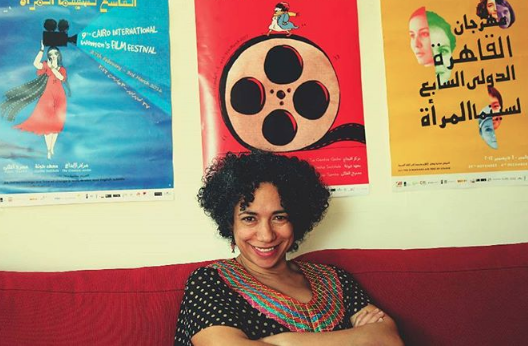In much-needed good news, Variety reports that Doha Film Institute (DFI) is awarding more than half of its spring grants to female filmmakers. In fact, women will receive about 66 percent of the funding. It’s usually a win when women comprise 40-something percent of festivals or awards, so this development is especially fantastic.
DFI is funding 29 projects in various stages of development. Nineteen of them are directed by women. More than 80 percent of the selected films take place in the Arab world. “It’s not deliberate on our part,” said DFI CEO Fatma Al Remaihi, “but it’s fantastic to see how more [Arab] women are being empowered to do films than ever before.”
Female filmmakers in the midst of post-production made the biggest splash. Four of the five selected films — about 80 percent — are women-helmed. The honored films are Sonia Kronlund’s “Nothingwood,” which follows “Z-grade movie” actor and director Salim Shaheen, Erige Sehiri’s “The Normal Way,” about five train conductors weighing their options while on a road trip, “Tiny Souls,” Dina Naser’s portrait of a young woman growing up in a refugee camp, and Amal Ramsis’ “You Come from Far Away,” an experimental project that follows a Palestinian father fighting in the Spanish Civil War.
Stories about the Somali National Women’s basketball team, a 20th wedding anniversary gone sour, a fashion show in the middle of the Algerian Civil War, and a young woman standing up to a monster are among the women-directed projects receiving DFI grants.
All of the female DFI spring grants recipients and synopses of their projects are below. List adapted from Variety.
Feature Documentary/Production
- Immolations (Algeria, Canada, Qatar) by Meriem Achour Bouakkaz, an intimate encounter with people who have attempted to set themselves on fire as a cry of distress against the infinite difficulties of simply finding their place in the sun.
- Nation’s Hope (Somalia, UAE, UK, USA, Sweden, Republic of the Congo, Qatar) by Hana Mire, covering a season in the lives of Somalia’s National Women’s basketball squad, as veteran coach Suad Galow leads the team of fearless young women against both rival teams and Al-Shabaab.
- Mnemosyne (Egypt, Qatar) by Shaza Moharam, a feature experimental/essay that depicts Shaza returning to her hometown of Alexandria, with a quest to recover from her childhood amnesia, only to find that the city itself is losing its memory
Feature Documentary/Post-Production
- Nothingwood (France, Germany, Qatar) by Sonia Kronlund about Salim Shaheen, the most prolific and popular actor-director-producer in Afghanistan. Passionate about cinema, he tirelessly makes Z-grade movies in a country that has been at war for over 30 years.
- The Normal Way (Tunisia, France, Qatar) by Erige Sehiri, in which five train drivers are torn between their loyalty to the old Tunisian railway company and the fresh personal aspirations they can finally express in the wake of the revolution, while on a road trip.
- Tiny Souls (Jordan, Lebanon, Qatar) by Dina Naser, which portrays the changes in Marwa’s life, as she goes from childhood to adolescence within the walls of the Al Zaatari refugee camp in Jordan, reflecting its effect on her reality and future.
- You Come from Far Away (Egypt, Lebanon, Qatar) by Amal Ramsis, an experimental/essay; Imagine your father is a Palestinian who fought against Franco in the Spanish Civil War. Imagine you have a family, but were raised without parents.
Feature Narrative/Development
- Don’t Tell a Soul (Lebanon, UK, Qatar) by Nour Wazzi, in which Faris must uncover the truth, when a dead body turns up and his relatives go missing
Feature Narrative/Production
- Papicha (Algeria, France, Morocco, Qatar) by Mounia Meddour about Nedjma, who refuses to submit to fear during the Algerian Civil War by fulfilling her dream of putting on a fashion show.
- Sofia (Morocco, France, Qatar) by Meryem Benm’Barek, which is set in Casablanca and charts the life of 22-year-old Sofia, the only daughter in a rather traditional family. While having dinner with her siblings, she discovers she is about to give birth.
- The Translator (Syria, Jordan, France, Qatar) by Rana Kazkaz and Anas Khalaf in which a political refugee returns illegally to Syria and risks everything to free his brother from the regime, as the Syrian Revolution begins.
Feature Narrative/Post-Production
- Ava (Iran, Canada, Qatar) by Sadaf Foroughi about an Iranian seventeen-year-old girl who challenges the strict rules of her traditional upbringing and learns that her mother broke the rules as a young woman as well.
- Joint Possession (Morocco, France, Qatar) by Leila Kilani, in which Pharaonic real estate projects surround the Mansouria, a land-locked family estate that is up for sale and coveted by Amina and her heirs.
- The Blessed (Algeria, France, Belgium, Qatar) by Sofia Djama; set in Algiers, a few years after the civil war, it follows Amal and Samir, who have decided to celebrate their 20th wedding anniversary at a restaurant, but the mood turns dark and becomes more volatile as the night wears on.
- The Seen and Unseen (Indonesia, Netherlands, Australia, Qatar) by Kamila Andini about Tantra, who becomes very sick and falls into a deep sleep, forcing his twin Tantri to go beyond words to communicate with him.
- Wajib (Palestine, UAE, France, Switzerland, Norway, Colombia, Qatar) by Annemarie Jacir about Shadi, who returns to his hometown to help his father hand-deliver his sister’s wedding invitations. As the estranged pair go house to house, the details of their fragile relationship come to a head.
Short Narrative/Production
- Inside Me (Egypt, Germany, Qatar) by Halla Tarek, about a young Egyptian girl, silenced by society, who goes on an adventure to discover her own voice fighting an evil monster.
- Last Day at Home (Qatar) by Noor Al-Nasr, in which his last day at home becomes a boy’s first day of an adventure.
- The Black Veil (Qatar) by A.J. Al Thani, where a woman attempts to finally escape, in order to gain freedom from the oppression she has been living under.







